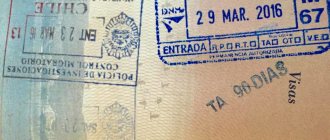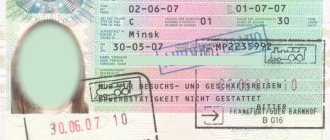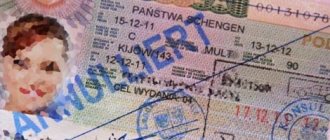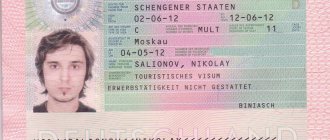What kind of visa is issued for a tourist trip?
For a tourist trip to Germany you need a Schengen visa. The easiest way is to get a C1 visa, which is valid for 30 days. If you are planning more than one trip to a country or a complex route through several EU countries, you need to apply for a multiple visa for a longer period.
- How much does it cost to go to Berlin?
- How to travel to Germany on your own
What kind of visa is needed for Germany: types
There are many reasons to visit the country. People on exchange programs and, of course, tourists come here every day on business, in search of work. At the airport, and before that at the visa center, the traveler is always asked about the purpose of the visit. Depending on it, approval is issued in different ways - for different periods. Let's take a closer look.
Business
Issued when it is necessary to visit the state for the purpose of employment or doing business. The employer sends the future employee a job offer, which guarantees the availability of an open vacancy. Typically, in this case, a visa is issued for a period of 1-2 years, with the possibility of increasing it when extending the contract. This is how many people later obtain a residence permit.
Student
Everything is very simple with her. In addition to the fact that Schengen is usually free (there is no need to pay a visa fee of about 5,000 rubles), it is also quickly processed. Documents confirming the existence of an exchange program or study at a German university are:
- an invitation indicating the amount of the scholarship, if any;
- address and period of residence;
- provision of tickets.
Usually they issue a national entry permit, but don't worry, you can also cross the borders of other European countries with it. In addition, this is a multiple visa, which allows you to cross the territory more than once.
Tourist
The most common document type. The purpose of the trip is to travel around German cities and visit attractions, so the pass is issued for a fairly short period. The easiest way to obtain a tourist visa to Germany is if you are traveling not on your own, but with a group of tourists, using a ticket from a tour operator. We recommend using the services of proffresh.travel. On the website you can choose the direction, suitable price and accommodation conditions. Why is this more profitable than traveling “savages”? Because there is no need to confirm hotel reservations, plane tickets, or length of stay in the country - everything is already included in the tour.
Guestbook
If you have relatives or friends living in Germany, you can quickly and easily obtain a document with an entry permit, especially if they are close relatives. By the way, the “Family Restoration” system works here, so if a tourist has a legal spouse waiting for him abroad, he can apply for citizenship for his other half. What do you need for a visa? An invitation issued officially. At the same time, the inviter must have a residence permit in one of the cities. That is, if he himself is a tourist or temporary resident, this cannot become a basis for inviting friends or relatives to visit.

Transit
What should you do if you are passing through the country in your vehicle, work truck, or even on a connecting plane? You also need to submit documents for an entry permit, but the length of stay will be minimal, and the purpose of the visit will be indicated as transit. Such papers are often received by truckers who have to cross the borders of any state for work.
Documents for a visa to Germany: list from 2021
- International passport (with two blank pages and not older than 10 years, valid for 3 months after leaving the Schengen zone);
- Questionnaire (see point 5);
- ICAO compliant photograph;
- visa fee (see point 3);
- health insurance (minimum coverage amount €30,000, all Schengen countries);
- a copy of the internal passport;
- a certificate from the employer indicating the salary, or an original bank account statement for the last 3 months, or a sponsorship letter + a copy of the first page of the sponsor's passport + any financial document of the sponsor in the original).

Germany
Photo for a visa to Germany – requirements for the applicant
- It is not recommended to come to the shoot with a dirty head, a stale look, after a sleepless night, or with a hangover. Men should shave, women should have a beautiful but simple hairstyle.
- The upper part of the shoulders falls into the frame, so it is better to wear a dark blouse or shirt. Otherwise, the tourist will blend into the background. You shouldn’t take pictures in a T-shirt or T-shirt - it ruins your reputation.
- There should be no accessories, piercings or falling bangs on the face. Glasses are only acceptable if worn regularly, and if they are used for vision, and not as part of the image.
- Before shooting, you need to look directly at the camera, your facial expression should be neutral.
If the applicant is registered to take biometrics, you can ask for a copy of the photo, which will be taken at the fingerprint reception center. Identical photographs will simplify identification.
Where and how to take a photo
To obtain a photo for a Schengen visa to Germany, you should choose one of the following methods:
| Take a photo in a regular photo studio | In most cases, specialists have information about the requirements for taking a particular photograph for each individual visa category for each individual country. The price tag fluctuates around 300 rubles - obviously, a lot depends on both the region and the company itself. |
| Get a photo at the visa center | A situation may well arise where a person comes to the center with a complete package of documents except for a photograph. In such cases, some organizations have an additional room on the premises where you can get photos. The cost will be higher than in a regular studio - about 500 rubles. The main point is that you should obtain information in advance about whether the selected visa center has such services or not. |
| On one's own | The actions in this option are obvious - use your own camera to take a photo, while trying to comply with the established requirements as much as possible. Then you will need to transfer the image onto paper. The price of this option will not exceed 20 rubles - the funds will be spent only on printing. |
However, it is worth considering that if you take photos yourself, there is a high probability that the photo will not be accepted at the visa center. Then you will have to go through the procedure again and pay for it in full.
Types of long-term visas for Germany
In order to enter the German state for one reason or another, you must first obtain a German visa.
To visit Germany, depending on the timing and reasons for the trip, obtaining permits can be done in two directions:
- According to category D;
- According to category C.
In other words, these are two types of visas that can be issued at the embassy to foreigners to cross the German border.
Features of category C visa
A category C permit can be issued for the purpose of a single or multiple visit. Most often this category has a short-term period. This kind of document is also called a Schengen visa. It is issued for a temporary and one-time visit to the country for up to three months.
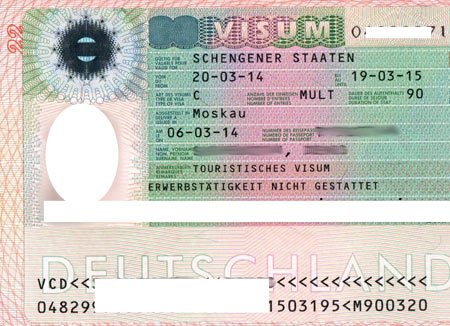
This is what a German C visa looks like
Typically, this permit is issued for one year, and thanks to it you can visit not only Germany, but also countries included in the Schengen agreement area.
This type of visa is quite convenient for a tourist tour that passes through several EU and Schengen countries.
If you need to get a multiple-entry pass through Germany, then you need to get a document such as a multiple visa.
It is intended for multiple visits to any EU country.
The Schengen category of the document is of a transit nature. If you don’t want to stay longer in upcoming projects and find work in Germany, then you can apply for this type of permit. To obtain a visa of this type, you must have certain reasons that will need to be explained to the consulate and the relevant migration authorities.

German Foreign Ministry building
Reasons for applying for a visa may be:
- Invitation request from friends, close relatives or a one-time trip of an entertainment nature;
- Business trip;
- Acquaintance with local attractions on a tourist tour;
- School or student trips under special programs or as part of creative and sports groups;
- In-depth study of local dialects;
- Transit;
- A trip to restore health in a German or European medical clinic;
- Participation in fashion shows, exhibitions and other cultural events.
Despite all these fairly common reasons for visiting Germany, the country's embassy will carefully check all documents received from the applicant, and explore possible unspoken other reasons for the visit. The most important thing that migration service workers will pay attention to is material wealth, health insurance and lack of a criminal record.
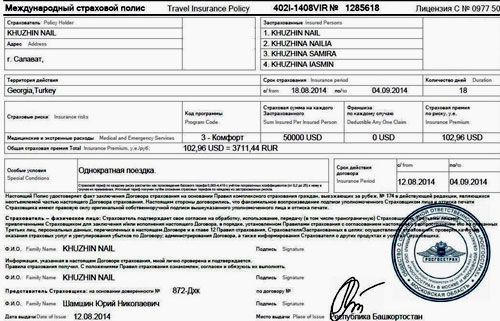
This is what an international insurance policy looks like
The German migration service is quite strict towards foreigners, and quite often issues visas strictly for travel to their country. Therefore, in order for a German Schengen visa to be valid for up to one year, it is necessary to explain to consular and embassy employees that there is a need to visit other European countries with this visa.
Features of the D visa
A category D permit can only act as an entry permit within Germany. But this type of visa has another small advantage - it allows transit through the Schengen zone states. This document is usually called a national visa.
Permits in this category allow you to work, study, reside legally and apply for German citizenship. This type of visa has its own terms and conditions for obtaining.
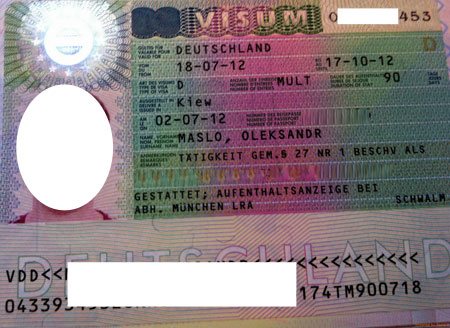
German visa category D
It is not issued for a year, as is the case with the Schengen type of document. Its registration will also take some time, but it will only be issued for a period of no more than ninety days. The main thing that distinguishes this visa from Schengen is that the national visa is extended by the migration service when crossing the German border.
Obtaining the rights to use category D visas can be in the following cases:
- if language courses last more than three months;
- studying at a university;
- you were married to a German or the purpose of your visit was family reunion;
- staying with a German family under a study or exchange program;
- to work by invitation.
For the most part, Germany is a rather conservative country, strictly observing its rules and laws, and obtaining visas through their consulates and migration services is a rather lengthy and troublesome matter. Therefore, it is possible to receive a negative answer if you say something incorrectly or provide an incomplete list of documents.
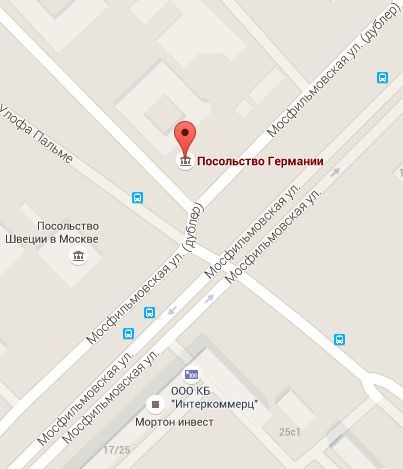
Map of the location of the German Embassy in Moscow
Features and differences of visas
Categories D and C differ from each other in terms of stay in the republic and the countries of the European Union. A national visa differs from a Schengen visa in type and the right to single or multiple crossings of the country’s border. A national category document initially has a very short validity period - up to three months, but it can be extended upon request already in Germany.
If you have an annual national German visa, then you can stay and live in Germany for the entire year. With an annual Schengen multiple entry visa, you can only stay in the country for 90 days in each six-month period; you cannot live in Germany permanently with it.
An annual Schengen visa is usually intended for tourist, student and business trips to EU countries. If business development involves multiple visits to the state, then you must obtain a national visa.
Entry into the country under a national visa category can be obtained in a few weeks or months, depending on the situation and the speed of processing of all data by the migration service.
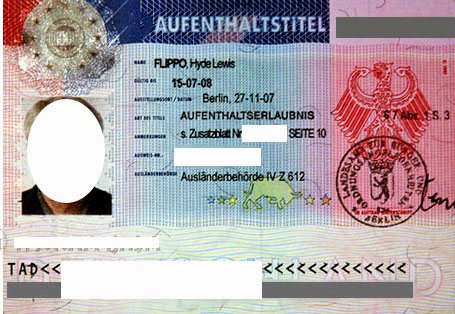
Example of a national German visa
At a time when a Schengen visa is issued within two to three days. In this case, Schengen can be issued in a language convenient for the applicant. When submitting documents and application forms for a national visa, they must be completed exclusively in the national language.
A German national visa provides the opportunity to get a job, study, reunite with family or to confirm your Jewish origin.
A national visa does not have such a broad validity as a Schengen visa, but it makes it possible to obtain citizenship of the country more quickly and easily.
German policy towards migrants is quite conservative and strict. For example, in order to be able to work normally, you must have a blue card or a national category pass to Germany. Each of these types can only be issued at the invitation of the employer.
Additional Information
Should a permit be issued to a child? If you are traveling with minor children, the documentation package for a German visa will have to be supplemented.
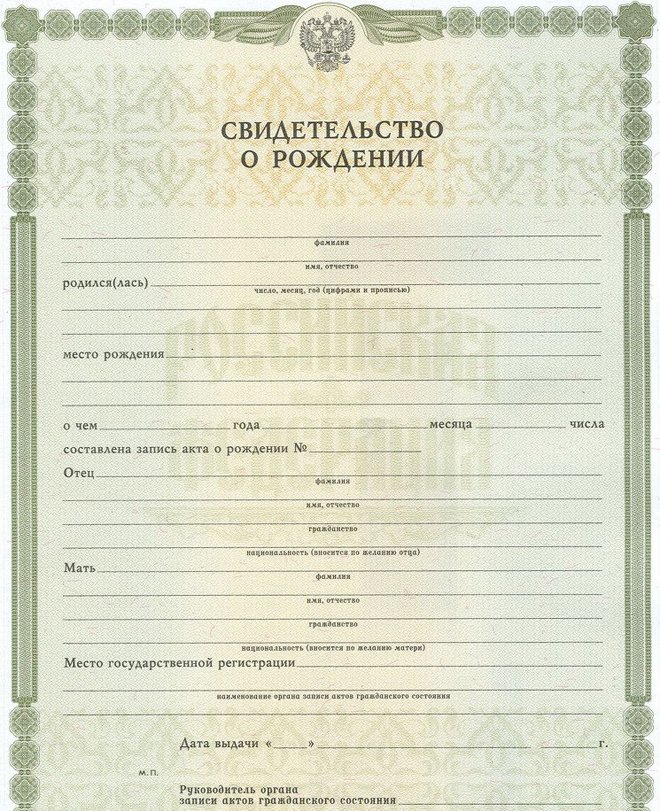
Child's birth certificate
Children under 14 years of age will need a travel permit and copies of their birth certificate.
Both documents are translated into English or German and notarized. Applying for a visa to Germany independently for children over 14 years of age requires a full copy of the Russian passport. Moreover, you must confirm your relationship with the child (or guardianship) and fill out forms in 2 copies for each child.
Starting from September 14, 2015, it is necessary to take fingerprints before applying for a visa to Germany. They will be valid for 5 years, after which this procedure must be completed again.
If you do not officially work, then in order to obtain a visa to Germany, you will have to provide bank statements from your bank accounts. There is another way. You can declare one of your immediate family members as the sponsor of the trip, provide financial documents indicating his solvency, and document the degree of relationship.
Consular sections of the German Embassy are located in Kaliningrad, St. Petersburg, Moscow, Yekaterinburg and Novosibirsk. By going to the Embassy’s website, you can find out which of these centers you belong to (there is also a list of required documents, you can check it). Please note that it is not the city of registration that is decisive, but the place of actual residence.
How to get a Schengen visa in an easier way? In some cases, it will be more convenient to submit documents for a Schengen visa to Germany through an accredited travel agency. Their list is also on the website of the German Embassy.
The above deadlines for obtaining visas to Germany may vary greatly depending on the current filling of consular departments with applications. If you are planning a trip during the summer, you will need to submit your documents a month in advance due to the length of time it takes to obtain permits during high demand times. At visa centers there is an option to pay extra for urgent processing, but it is important to play it safe.
What is the cost of obtaining a Schengen visa to Germany? The consular fee for Russians is 35 euros if you are interested in an annual visa. This amount is paid in rubles at the exchange rate at the time of payment.
Types of Invitations
This type of permit to stay in the country has a number of features. For private visits to Germany, you need to apply for a C visa. This is a short-term visa (up to 90 days) for trips by invitation. There are several types of invitations for a private visa to Germany in 2021:
- to visit relatives or friends. Such an invitation can be official or in free form;
- for business, for example, for a meeting with partners or a seminar;
- for other purposes, such as treatment or language courses.
Multiple visa to Germany

